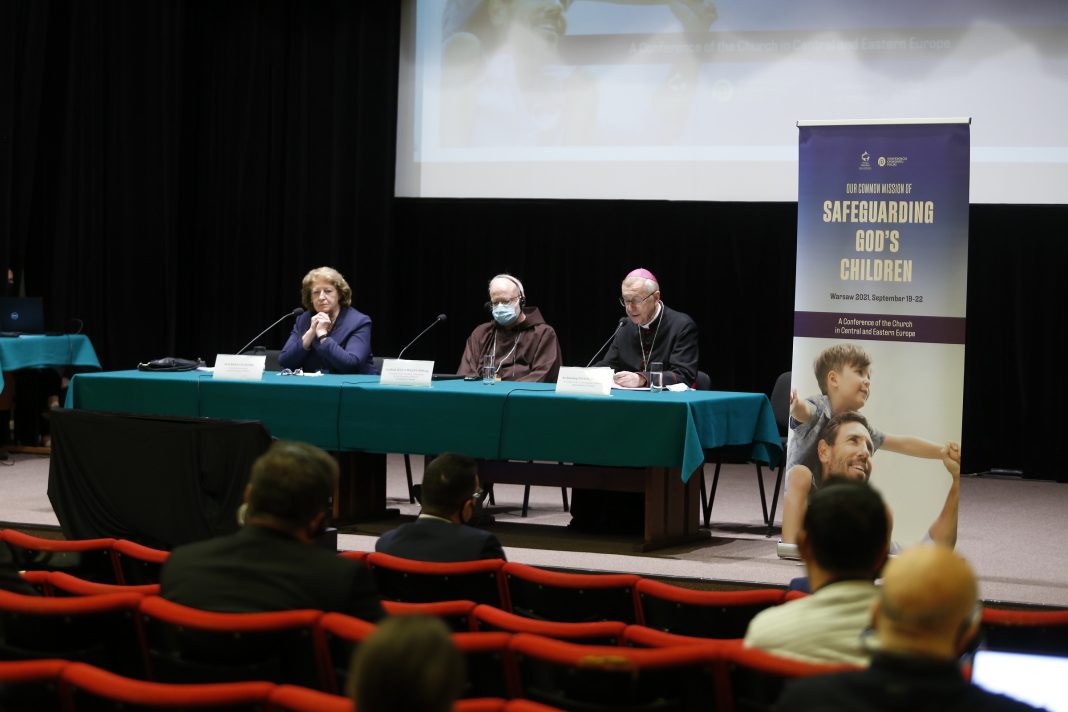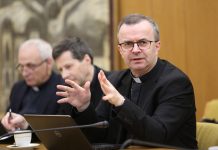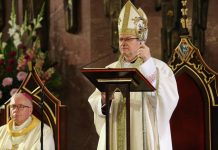“We meet today in order to share our experiences and also to support the protection of children and initiate necessary cooperation,” said Archbishop Stanisław Gądecki, the President of the Polish Bishops Conference, at the opening of the international conference of the Churches of Central and Eastern Europe on the protection of minors, which is being held in Warsaw on 19-22 September this year.
The Episcopate’s President emphasized that the Polish Episcopate has been working for years in the field of the protection of minors. He noted that the pioneer of this activity is the Coordinator of the Polish Catholic Bishops Conference for the Protection of Children and Young People, appointed to this position by the PCBC in 2013. A year later, the Child Protection Center was founded.
Archbishop Gądecki noted that in each diocese and religious congregation, pastoral ministers of the victims have been appointed, “to provide spiritual care to those who desire it, so that the Church wounded by crime can become a place of healing. Of course, we also offer psychological help to the victims, but we recognize that this tragedy also has a spiritual dimension.”
The President of the Episcopate recalled that at the national level, in 2019, Archbishop Wojciech Polak was appointed PCBC delegate for the protection of children and young people, and his office was established at the PCBC secretariat. He also said that the Polish bishops had also decided to establish the PCBC’s Saint Joseph Foundation, which for the past two years has been allocating funds for prevention and education activities as well as assistance to the victims.
“I’m mentioning these people and institutions to show the enormity of the efforts of the Church in Poland, and also to thank those who have done much good in this area over the years,” Archbishop Gądecki said. “We take to heart the call of the Holy Father Francis not to care primarily about the image of the institution, about the «external side of the chalice and bowl», but above all about the good of the victims,” he added.
The Episcopate’s President assessed that in order to effectively protect children and help the victims, it is necessary to admit that our resources are too weak. “It must be honestly acknowledged that we have committed many negligent acts toward the victims in the Church. This kind of facing of the truth, however, should not lead us to defeatism or despair, but to a pastoral conversion – of which Pope Francis speaks – that makes the safeguarding of the child or the disabled and helping the victims a priority not only for a select few, but also for each one of us,” he concluded.
Polish Catholic Bishops Conference Press Office
We publish the full text of the Message:
Message from Archbishop Stanisław Gądecki, President of the Polish Catholic Bishops Conference at the opening of the international conference
of the Churches of Central and Eastern Europe
„Our Common Mission of Safeguarding God’s Children” in Warsaw (19.09.2021)
- I would like to start by extending a warm welcome to all the participants of our meeting headed by Cardinal O’ Malley and the commissioners of the Pontifical Commission for the Protection of Minors, which is the initiator and organizer of this important international conference. I warmly welcome the delegates of the friendly communities of the Roman Catholic and Greek Catholic Church from Albania, Croatia, Slovenia, Hungary, Romania, Moldova, Bulgaria, the Czech Republic, Slovakia, Ukraine, Russia, Estonia, Latvia, Lithuania, Belarus, Serbia, Montenegro, North Macedonia, and Kosovo. Thank you very much for accepting the invitation and coming to Warsaw.
- The motto of our conference – “Our common mission of safeguarding God’s children” – resonates with the words of the Gospel which we heard in today’s Sunday liturgy of the Word. The Lord Jesus – after foretelling His Passion and emphasizing the value of an attitude of humble service – “He took a little child whom he placed among them. Taking the child in his arms, he said to them, “Whoever welcomes one of these little children in my name welcomes me; and whoever welcomes me does not welcome me but the one who sent me.” (Mark 9:36-37). Our Savior is not afraid to hug a child. His gesture is transparent, full of fatherly tenderness, free from ambiguity. Moreover, the Lord Jesus points to accepting the child with love as the way to accept God Himself.
In the parallel passage of the Gospel according to St. Matthew, Jesus’ words read: “Truly I tell you, unless you change and become like little children, you will never enter the kingdom of heaven. Therefore, whoever takes the lowly position of this child is the greatest in the kingdom of heaven.” (Matthew 18:3-4). Children who are trusting and humble provide a model of simplicity for all of Jesus’ disciples, but Jesus also warns: “If anyone causes one of these little ones—those who believe in me—to stumble, it would be better for them to have a large millstone hung around their neck and to be drowned in the depths of the sea. Woe to the world because of the things that cause people to stumble! Such things must come, but woe to the person through whom they come!” (Matthew 18:6-7). Our Lord uses very harsh words against the perpetrators of evil who harm children, but also against those who might take such harm lightly: “See that you do not despise one of these little ones. For I tell you that their angels in heaven always see the face of my Father in heaven. For the Son of Man has come to save that which was lost.” (Matthew 18:10-11). We gather here to be healed of indifference, much less of disregard for the harm to children.
- When we speak of “safeguarding,” we do not limit ourselves to children in the strict sense of the word. We are also mindful of young people, but also of those who are vulnerable and manipulated. The Holy Father Francis emphasizes in his motu proprio “Vos estis lux mundi” that human and legal intervention is also required in cases of abuse of power, deceit or coercion, also against adults. The Holy Father also reminds us that it is not only about sexual abuse, but also abuses of power and conscience. When I met with victims, I have often heard stories in which the sexual abuse was preceded by manipulation, aimed at gaining the trust of these people and therefore a certain power over the life of the person, who in the face of such manipulation is defenseless. It is not uncommon for the perpetrator to make the victims believe that what he is inducing and coercing them to do does not constitute any evil. In this way, sexual abuse is often linked to the abuse of power and conscience, deepening the devastation that this crime wreaks not only in the psyche but also in the soul of the wounded person.
- Children are therefore entrusted to our care and are to be welcomed but also protected. In Poland we have been trying to act in this direction for years. A pioneer of this activity is the Polish Catholic Bishops Conference’s Coordinator for the Protection of Children and Young People, appointed to this position by the PCBC in 2013. A year later, they founded the Child Protection Centre, which has been with us seven years now, inspiring action in the field of broadly understood prevention, as well as educating specialists in this field every year at postgraduate studies at the Ignatianum Academy. It was they who proposed that each diocese and men’s religious congregation should have a delegate to make initial contact with victims and to receive their reports. Over the past seven years, the delegates have done a tremendous amount of work to ensure that the victims – now often adults – are welcomed and heard in the Church and that their wrongs are judged according to the law.
With the release of Pope Francis’ motu proprio “Vos estis lux mundi,” their role has grown even more important. However, the legal dimension of this problem – while very important – is not sufficient. That is why every diocese and religious congregation has appointed pastoral workers for the victims – to provide spiritual care to those who wish it, so that the Church wounded by crime can become a place of healing. Of course, we also offer psychological help to the victims, but we recognize that this tragedy also has a spiritual dimension.
We also recognize that clergy accused of sexual abuse – also when convicted – fall into a loneliness that creates a frustration that is dangerous to the accused or convicted priest as well as to his potential victims. That is why we have created the role of the guardian of accused or convicted clergy to supervise these individuals, to require them to comply with all restrictions imposed, and to support them in moments of depression or despair.
In order to focus not only on intervention but also on prevention, a team responsible for the accused person has been established in each diocese, made up of people with different tasks. In addition to the guidelines of the Polish Catholic Bishops Conference, most dioceses and religious congregations have adopted norms of good practices and principles of prevention.
Finally, at the national level, we have noticed the need for a bishop who will be a sign of the Church’s concern for the victims. Therefore, in 2019, Archbishop Wojciech Polak was appointed the PCBC delegate for the protection of children and young people, and his office was created at the PCBC secretariat.
The Polish bishops have also decided to establish the Saint Joseph Foundation of the PCBS, which for two years now has been allocating large financial resources for prevention and education, but also for helping the victims where for some reason dioceses or religious congregations are unable to do so.
In addition, lay people have founded the “Wounded in the Church” initiative, which operates a hotline for people who have been wronged, as well as a team of therapists, lawyers, and people of goodwill who are willing to support people who have been wronged.
I mention these people and institutions to show the enormity of the effort made by the Church in Poland, and also to thank those who have done much good in this area over the years. We take to heart the call of the Holy Father Francis not to care first of all about the image of the institution, about the “external side of the cup and bowl,” but first of all about the good of the victims.
- There is also the danger that all these actions will lull our sense of responsibility into the belief that, after all, we are already doing so much for this cause. However, coming into contact with the tragedy of so many people who have been wronged, as I was able to experience personally when listening to a number of people before the Vatican summit in 2019, reveals that in the face of the enormity of the wounds, many efforts remain insufficient. New tragedies are being uncovered, and the number of cases coming from our region in recent years to the Congregation for the Doctrine of the Faith astonishes this experienced Institution.
In order to safeguard children and help the victims effectively and successfully, we must humbly admit that our strengths are too weak. It must be honestly acknowledged that we have committed many negligent acts toward the victims in the Church. This kind of facing of the truth, however, should not lead us to defeatism or despair, but to a pastoral conversion – of which Pope Francis speaks – that makes the safeguarding of the child or the disabled and helping the victims a priority not only for a select few, but also for each one of us.
- There is another motive for hope; the commitment of the entire Church community. We are here in communion with the Holy See, represented by Cardinal O’Malley and the Pontifical Commission, and in communion with many fraternal local Churches. We meet today to share our experiences, to support each other on the path of child protection and to initiate the necessary cooperation. We are here as laity, consecrated persons, presbyters, and bishops. Only in this way can we fruitfully and effectively undertake this important and demanding task. Before we can make the victims feel that they are not being left to themselves, it is necessary that we ourselves make this effort. The Risen Lord and the community of the people of God are with us.
At the initiative of Pope Francis, we are living this time as a year dedicated to St. Joseph. This saint is a very important figure for us because he saved the Child and His Mother from mortal danger. St. John Paul II called St. Joseph the Protector and Defender. I am confident that his powerful intercession accompanies us today, so that we too, wherever God sends us, may become true protectors and defenders of the weakest and the vulnerable.
(Translated from Polish by K. Łazarz-Górska / Office for Foreign Communications of the Polish Bishops’ Conference)

 English
English







